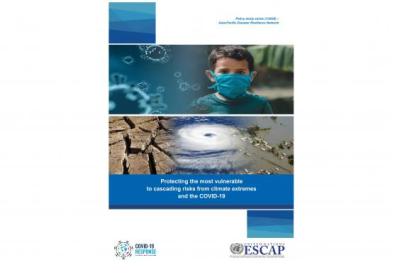The United Nations Economic and Social Commission for Asia and the Pacific (ESCAP) has published a policy study concerning the impending climate risk scenarios in South Asia and their intersection with the COVID-19 pandemic. The aim of this report is to facilitate policy actions that could protect communities at risk as well as to lay the foundations of resilient recovery of the most vulnerable in South Asia.
ESCAP has published two additional reports this year, one on the “Impact and Policy Responses for COVID-19 in Asia and the Pacific”, which presents an initial assessment of the COVID-19 pandemic in Asia and sub-regional report entitled “COVID-19 and South Asia: National Strategies and Subregional Cooperation for Accelerated Inclusive, Sustainable and Resilient Recovery”, which provides a comprehensive situation analysis of South Asia. This newly published policy study is hence an addition to the previous reports and sheds light on how to manage disasters during COVID-19 through specific spolicy actions. A total of three key messages are suggested to support risk informed policy interventions, including 1. protecting the most vulnerable from the cascading risks, 2. building resilience of the most vulnerable in multi-hazard disaster risk hotspots, and 3. towards building resilience, governments should work towards breaking the vicious circle of poverty, inequalities and disasters.
At the time of publication of the report, South Asia accounts for 8.5 per cent of the global total confirmed cases and 4.2 per cent of total deaths. The COVID-19 pandemic has enforced “social distancing” practices in many parts of the world. Consequently, standard operation systems across all sectors based on physical contact and/ or the movement of people have been impacted drastically to prevent the spread of COVID-19. This has also affected the management of disasters and disaster risks. As a result disaster responses must change accordingly.
Every year, South Asia faces climate hazards such as floods, droughts, tropical cyclones and heat waves. Especially during the Southwest monsoon period, from June to September, floods and droughts peak. According to the report, “as the South Asian monsoon season begins, the spread of COVID-19 is also peaking, and more than 70 per cent of the total confirmed COVID-19 cases are reported within the last one month in South Asia.” For this reason, protecting people and enhancing resilience is one of ESCAP’s key priorities while supporting the socioeconomic response of Asia and the Pacific to the COVID-19 pandemic.

